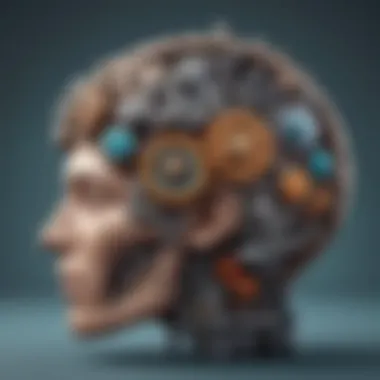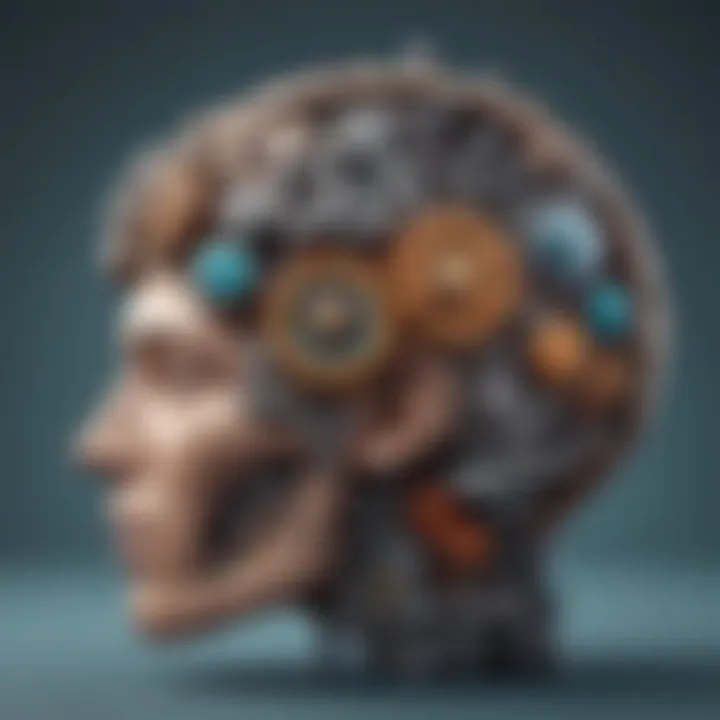Explore the Best New Self-Help Books of 2023


Intro
In the crowded world of self-help literature, new titles are released regularly, each promising to guide readers towards personal growth and improved life skills. With so many choices, discerning which books truly stand out can feel overwhelming. This guide aims to provide clarity, diving into the best new self-help books that have recently made waves in the literary ocean. By examining the key themes and insights presented in these works, we can appreciate how they address contemporary challenges in personal development, while also empowering readers to make meaningful changes in their lives.
A deep well of knowledge awaits within the pages of these transformative books, and understanding their unique contributions is essential for anyone looking to enhance their journey. So, buckle up as we explore the newer faces in the self-help genre, ready to equip ourselves with valuable perspectives and tools for growth.
Key Concepts and Insights
Main Ideas from the Book
Each new self-help book brings with it a tapestry of ideas designed to resonate with a diverse audience. Let’s dig into some of the main messages presented in these recent titles:
- Understanding Emotional Intelligence: Many new books focus on how to harness emotional intelligence as a means of improving communication and relationships. They often provide anecdotes and research that emphasize its role in both professional and personal contexts.
- Mindfulness and Presence: There is a noticeable trend towards mindfulness, with authors exploring techniques for being present in the moment. They suggest that cultivating awareness can lead to better decision-making and reduced stress levels.
- Goal Setting with a Twist: Several books are reimagining goal setting by encouraging readers to redefine success on their own terms, often steering clear of societal expectations.
- Resilience in Uncertain Times: Authors draw attention to the importance of developing resilience, offering strategies to navigate through life’s unpredictability. They emphasize that adapting to change is crucial, particularly in today’s fast-paced world.
"The greatest weapon against stress is our ability to choose one thought over another." – William James
Practical Applications of Concepts
What good are the brilliant concepts if we don’t know how to implement them? Here are a few practical applications derived from these books:
- Daily Mindfulness Exercises: Simple techniques such as breathing exercises or journaling practices can be easily integrated into daily routines.
- Networking with Purpose: By applying emotional intelligence, readers can engage more meaningfully during professional networking events, fostering genuine connections rather than superficial interactions.
- Redefining Metrics of Success: Taking the time to identify personal values helps align goals with what genuinely matters, leading to more fulfilling pursuits.
- Building a Resilience Bank: Curating a personal toolbox of coping skills allows readers to draw upon resources during challenging times effectively.
Recommendations and Further Reading
For those eager to dive even deeper into the world of self-help, consider exploring the following related books that continue the conversation on personal development:
- "Atomic Habits" by James Clear: Focuses on the power of small changes to yield significant results over time.
- "The Power of Now" by Eckhart Tolle: An exploration of how living in the present can lead to emotional liberation.
- "Grit: The Power of Passion and Perseverance" by Angela Duckworth: Betokens the importance of perseverance in pursuing long-term goals.
Additional Resources for Personal Development
Broaden your horizons by checking out these useful resources:
- Wikipedia on Emotional Intelligence
- Britannica's Guide on Mindfulness
- Explore communities on Reddit for discussions and recommendations.
- Follow self-help influencers on Facebook for daily inspiration and tips.
Wrapping this up, this comprehensive guide lays the groundwork for navigating through the abundant self-help landscape. The insights derived from these notable titles provide a firm base for anyone looking to foster genuine growth and hone essential life skills.
Prolusion to Self-Help Literature
Self-help literature has carved out a distinct niche in publishing, shaping the way individuals approach personal development. Its importance in today's fast-paced world cannot be overstated. With rising pressures from work, relationships, and societal expectations, people often seek guidance in the form of self-help books. They're not just about improving oneself in a superficial way but rather engaging with deeper questions of identity, purpose, and mental well-being. The genre offers a lifeline, presenting tools and frameworks for individuals who strive for resilience and growth.
The Evolving Paradigm of Self-Help
The self-help industry has seen a transformation over the years. Initially, the genre was dominated by formulaic approaches and one-size-fits-all prescriptions. However, the landscape has evolved significantly. In recent times, there's a noticeable trend towards personalization. Readers want to find their own way through tailor-made guidance that draws from varied sources, including psychology, philosophy, and personal anecdotes.
Moreover, books are increasingly being infused with scientific research, which helps ground self-help concepts in empirical evidence. The acceptance of psychological principles allows readers to navigate their personal challenges with confidence. As modern life continues to present complex challenges, self-help literature has adapted, becoming more relevant and nuanced in its exploration of human behavior and potential.
Importance of Contemporary Self-Help Books
Contemporary self-help books play a vital role in fostering not just individual growth, but also societal well-being. They can be seen as mirrors reflecting the collective struggles and aspirations of modern society. Readers can find solace knowing they are not alone in their struggles—many contemporary authors share their personal journeys alongside practical exercises and insights.
By focusing on themes like mental health, resilience, and mindfulness, these books consciously address contemporary issues. They empower individuals with the tools necessary for navigating increasingly complex life landscapes. The messages often encourage readers to cultivate self-awareness and develop emotional intelligence, skills that are essential in today’s world.
Consequently, the significance of these works extends beyond mere self-interest. They contribute towards creating a collective consciousness that values personal development, mental well-being, and empathy.
"Self-help is not a destination but a continuous journey toward better understanding oneself and others."
In summary, the introduction of self-help literature in this article underscores its relevance in personal growth. As we delve into selected literary contributions, it becomes clear that self-help is both an enriching and necessary endeavor for those seeking to improve their lives and, in turn, the lives of those around them.
Criteria for Selecting Noteworthy Titles
Choosing the right self-help book can be like finding a needle in a haystack—overwhelming and often confusing due to the sheer volume of options out there. This section aims to clarify the essential criteria for handpicking titles that not only resonate with readers but also pack a meaningful punch in their personal development journeys. The following elements are pivotal when discerning noteworthy self-help books:
- Authenticity of Author Experience: The background and life experiences of an author can significantly impact the authority and credibility of a self-help book. Readers often seek authenticity; they want to know that the person guiding them has walked the walk, not just talked the talk. When authors share their struggles, failures, and insights gained along the way, their narratives resonate on a personal level. For instance, consider Brene Brown’s Daring Greatly, where she candidly discusses vulnerability and its power in our lives, showcasing her own journey towards understanding this complex topic.
- Reader Reception and Impact: Understanding how books are received by their audience is crucial in selecting noteworthy titles. A book's popularity isn’t just about sales numbers; it also involves how readers engage with the material. Reviews and testimonials can provide a glimpse into this reception. For example, look at Atomic Habits by James Clear. The book has sparked widespread discussion on habit formation, indicating a profound impact on readers' lives. Positive feedback, critical acclaim, and even the formation of online communities around a book are indicators of its significance in the self-help genre.
Through these criteria, one can sift through the mountains of available options and zero in on books that truly offer valuable insights and practical guidance. The careful selection process not only enhances the reading experience but also ensures that the wisdom gleaned can be genuinely transformative.


Emerging Trends in Self-Help Books
As society evolves, so do the methods and perspectives within self-help literature. The landscape of personal development is being shaped by diverse voices and a deeper reliance on research-backed approaches. Emerging trends in self-help books are not just a passing fad; they reflect significant shifts in how individuals seek to enhance their lives and cultivate personal growth.
One major trend is the integration of scientific principles with self-improvement strategies. This shift brings a level of credibility and depth to the often subjective narratives that have long characterized the self-help genre. Understanding the psychological mechanisms behind habits and behaviors can provide readers with practical, data-driven approaches to change, steering them clear from practices that might feel like mere guesswork.
In addition, there is a marked movement towards inclusivity in self-help narratives. Diverse voices are making their mark, offering readers fresh perspectives that resonate with a wider audience. This is crucial, as personal development is not a one-size-fits-all endeavor. Different backgrounds, experiences, and identities inform unique journeys of self-improvement. Thus, books that reflect a spectrum of life experiences contribute to a more holistic understanding of human potential and achievement.
"Emerging trends in self-help literature highlight the transformational power of integrating scientific research with personal narratives, making the journey to self-fulfillment more accessible and relatable."
By embracing these trends, contemporary self-help books are poised to not only empower individuals but also to provoke thought and drive meaningful discussions surrounding personal growth.
Integration of Science and Psychology
The blending of scientific research with psychological insights is a hallmark of current self-help literature. Readers are increasingly looking for evidence-based methods to navigate their personal challenges. By grounding their approaches in established psychological principles, authors can elevate the dialogue surrounding self-help.
Books that incorporate cognitive behavioral therapy techniques or mindfulness practices rooted in neuroscience offer strategies that can lead to tangible results. For example, understanding how the brain responds to certain stimuli can empower individuals to reshape their thinking patterns and emotional responses. Here, practical exercises, relatable case studies, and actionable tips add the necessary meat to the bones of theoretical concepts, making the information easily digestible and applicable.
Benefits of Scientific Integration
- Credibility: Readers feel more assured knowing that the methods they're trying have been tested and validated.
- Practicality: Scientific approaches often come with structured methodologies, allowing readers to see clear pathways to improvement.
- Adaptability: Understanding underlying principles enables individuals to tailor methods to fit their own unique circumstances.
The intersection of evidence-based research with personal development promises to enrich self-help literature, making strides towards empowering readers with reliable tools for transformation.
Diverse Voices in Self-Help
Another key feature shaping self-help books is the rise of diverse authors who bring unique life experiences and cultural insights to the table. This trend matters because self-help can often feel alienating, primarily when it’s dominated by a narrow narrative. Authors from different backgrounds can craft narratives that resonate more profoundly with readers facing varied personal challenges.
A wealth of perspectives ensures that readers encounter relatable content that speaks to their individual journeys. For instance, a self-help book written by someone who has navigated systemic barriers can offer insights that purely personal stories may overlook. Additionally, addressing topics through diverse cultural lenses can instill a sense of belonging and understanding.
Some notable existing trends within this movement include:
- Culturally-Aware Strategies: Authors reflect on traditions and practices specific to their cultures, offering age-old wisdom alongside modern methods.
- Intersectionality: Writers explore how different facets of identity—race, gender, sexuality—affect personal growth and challenges in unique ways.
- Community-Centric Approaches: Many of these authors emphasize collective development, illustrating how personal improvement is often deeply tied to communal well-being.
Highlighted Self-Help Books of the Year
In the rapidly evolving world of self-help literature, certain titles stand out like beacons guiding readers toward personal transformation. The year brings forth an array of new releases that meld innovative thinking with established methodologies, providing fresh perspectives on age-old challenges. These highlighted self-help books serve not just to instruct but to inspire, fostering a deeper connection between the reader's aspirations and tangible outcomes in their lives.
This section makes a deliberate effort to spotlight works that reflect significant contemporary trends in self-help. These books cater to diverse audiences with varying needs, ensuring that readers from all walks of life can find something that resonates with their journey. Beyond pure entertainment, self-help literature has become an essential tool in navigating the complexities of modern existence.
Innovative Approaches to Personal Growth
Among the standout titles this year, several take groundbreaking approaches to personal growth. One notable example is "The Art of Not Giving a F*ck" by Mark Manson, which dives into the importance of prioritizing what truly matters. Manson's frankness turns conventional wisdom on its head, suggesting that embracing life's challenges head-on enables individuals to craft their narratives. No frills, no sugar-coating—his style resonates with readers who crave authenticity in an often overly sanitized genre.
Another remarkable entry is "Atomic Habits" by James Clear, which presents a unique framework for building effective habits. Clear breaks down the process into manageable steps, illustrating how minor changes can lead to significant growth over time. His blend of scientific research and real-life examples creates a compelling narrative, inviting readers to rethink their approach to habit formation. The focus on incremental improvement makes this book suitable for anyone feeling overwhelmed by the prospect of transformation.
Perhaps most interesting is how these innovative books foster a sense of agency. Rather than simply prescribing solutions, they encourage readers to engage in a dialogue with the material, prompting reflection and personal assessment. The collaborative space created by authors like Manson and Clear enhances the practical utility of their work, enabling readers to tailor insights to their specific circumstances.
Classic Themes Revisited
While fresh concepts are crucial, revisiting classic themes also holds significant weight in today's self-help landscape. "The Power of Now" by Eckhart Tolle remains a seminal text, bringing timeless wisdom into the contemporary discourse. Tolle's teachings on mindfulness and being present in the moment remind readers of the importance of grounding themselves amid external chaos. His work is a rallying call for those navigating the frenetic pace of modern life, reminding them that true peace resides in the present.
Moreover, books like "How to Win Friends and Influence People" by Dale Carnegie continue to teach invaluable interpersonal skills that remain relevant in the age of digital communication. Carnegie’s principles of empathy and active listening find new relevance as social media transforms how people connect. In a world where personal interactions are increasingly mediated through screens, understanding the art of human connection is vital.
These classic books underscore that while methodologies may evolve, the underlying principles of human engagement and personal growth remain fundamentally the same.
As we sift through the sea of self-help titles published in the past year, the highlighted selections not only celebrate innovative approaches but also pay homage to the timeless themes that shaped the genre. This balance highlights the rich tapestry of self-help literature, encouraging readers to explore both new ideas and cherished classics in their journey toward self-improvement.
Deconstructing Key Lessons from Each Book
Delving into the key lessons from the top self-help books of the year is crucial for understanding how these works transform lives. Each book not only presents its narrative but a toolkit of ideas that readers can apply to everyday challenges. The significance lies in extracting these lessons and translating them into actionable strategies for improvement. By dissecting the methodologies and practical applications these authors put forth, readers can find concrete ways to incorporate insights into their lives, making personal growth less daunting.
Methodologies for Self-Improvement
Self-help literature often revolves around specific methodologies aimed at helping individuals make sustainable changes. These methodologies can range from cognitive-behavioral approaches to mindfulness practices, each serving unique purposes. For instance, consider James Clear's Atomic Habits, which emphasizes the power of tiny changes — just 1% improvements — that, when compounded over time, can lead to remarkable results.


The heart of these methodologies lies in their accessibility. They offer readers a structured way to approach personal development without feeling overwhelmed. Many authors draw on scientific research to demonstrate efficacy, which adds credibility and encourages readers to commit.
Moreover, a recurring theme in recent self-help books is the emphasis on self-compassion. Rather than pushing one's limits incessantly, books like Kristin Neff's Self-Compassion advocate for understanding and kindness to oneself during the journey. This shift to methodologies that prioritize mental well-being enhances motivation and resilience, making personal growth feel less like a chore and more like a rewarding adventure.
Practical Applications of Insights
The journey through self-help literature comes with a trove of insights ready for application. This is where the rubber meets the road. For example, The Gifts of Imperfection by Brené Brown teaches the importance of vulnerability. But how can readers apply this? One way is by initiating open conversations with friends or colleagues, sharing experiences that may feel uncomfortable but ultimately build deeper relationships.
"Vulnerability is not weakness. And that myth is profoundly dangerous." - Brené Brown
Another great example is in Mindset: The New Psychology of Success by Carol Dweck, where the concept of a growth mindset is outlined. Readers can practice reframing their failures as learning opportunities, reflecting on what went wrong and what to try differently next time. This shifts the focus from self-blame to curiosity, thus fueling personal growth.
Practical applications are often where readers see real transformation in their daily routines. Whether it's setting SMART goals from Your Best Year Ever by Michael Hyatt or engaging in gratitude journaling derived from The Gratitude Diaries by Janice Kaplan, these insights create a more proactive approach to life.
The Role of Mindfulness in Self-Help
In the realm of self-help literature, the concept of mindfulness has carved a niche that resonates deeply with individuals seeking significant personal growth. At its core, mindfulness encourages a present-focused awareness, which can foster emotional regulation and clarity in decision-making. It serves as a foundation upon which many modern self-help books are being built, highlighting its importance in the evolving landscape of personal development.
Mindfulness not only helps in reducing stress but also empowers individuals to navigate life’s complexities more effectively. This could mean tackling anxiety, improving relationships, or enhancing productivity. It bridges the gap between thought and action, allowing readers to become more aware of their choices and emotions.
"Mindfulness is a way of befriending ourselves and our experience." – Jon Kabat-Zinn
Incorporating mindfulness can also be a transformative process, turning simple actions—like walking or eating—into conscious practices that promote well-being. The practice encourages individuals to reflect on their thoughts and feelings with a greater understanding, rather than merely reacting to them. Hence, the growing interest in how mindfulness techniques are integrated into self-help narratives shines a light on this essential component of self-improvement.
Mindfulness-Based Approaches
Mindfulness-based approaches aim to cultivate an environment of self-reflection and presence. Many self-help authors have embraced mindfulness as a core tenet in their works, illustrating various techniques and exercises that readers can adopt.
- Mindfulness-Based Stress Reduction (MBSR): Developed by Jon Kabat-Zinn, MBSR is a structured program that blends mindfulness meditation and yoga. It teaches individuals to observe their thoughts and feelings without judgment, enhancing their ability to cope with stress.
- Mindful Self-Compassion: This approach, advocated by Kristin Neff, combines mindfulness and self-compassion. It encourages individuals to treat themselves with the same kindness and understanding they would offer a good friend, which can be especially beneficial during difficult times.
- Brief Mindfulness Practices: Authors often recommend short, practical exercises to integrate mindfulness into daily routines. This might involve mindful breathing exercises that can take only a few minutes but provide substantial emotional benefits.
By employing these methods, individuals can begin to rewire their thought patterns, creating healthier responses to life's challenges. Books focusing on these approaches not only provide guidance but also act as companions in the journey of self-discovery.
Meditation Techniques for Personal Growth
Meditation plays a pivotal role in cultivating mindfulness and enhancing personal growth. It provides clarity, discipline, and insight, making it a prevalent theme in many contemporary self-help books.
- Guided Meditation: This technique often involves following an instructor or a recording, which helps individuals dive into a meditative state more easily. Many self-help authors include downloadable guided meditations to assist readers in their practice.
- Body Scan Meditation: A popular method for beginners, this practice encourages awareness of bodily sensations, promoting relaxation and a sense of connection with one’s physical self. It’s often used as a tool to reduce anxiety and improve body image.
- Loving-Kindness Meditation: This unique technique shifts focus away from oneself and radiates warmth and kindness toward others. It’s an effective method for cultivating compassion which is crucial for successful interpersonal relationships.
By embracing these meditation techniques, readers can not only foster mindfulness but also unlock a deeper understanding of themselves. In an age where distractions are plentiful, incorporating meditation into one’s daily routine can prove beneficial in maintaining focus and nurturing emotional well-being.
Self-Help in the Digital Age
The landscape of self-help has transformed significantly in recent years, primarily due to the digital revolution. Gone are the days when one would rely solely on physical books or seminars to gain insights and foster personal growth. Today, with a single click, anyone can delve into a wealth of information, connect with like-minded individuals, and access tools that can aid in their journey toward self-improvement.
The importance of exploring self-help in this digital age cannot be overstated. It offers an unprecedented level of accessibility and variety that was once unimaginable. Individuals can explore resources that cater to their unique needs, preferences, and learning styles. This section will examine how online platforms and digital innovations have bolstered the self-help movement, making it more inclusive and adaptable than ever before.
Influence of Online Resources
The rise of the internet has birthed a plethora of online resources, which serve not just as supplementary material but as foundational elements in one’s self-help journey. Blog posts, podcasts, and video content provide diverse mediums for absorbing information.
Many reputable figures in the self-help arena have adopted platforms like YouTube to share their latest methodologies and techniques. This form of outreach brings down barriers that might keep individuals from engaging with traditional self-help materials, promoting self-education. Additionally, the visual and auditory components in these resources can enhance understanding and retention of complex ideas.
Here are a few notable ways online resources impact personal development:
- Accessibility: Free and low-cost options allow for a wide range of people to access material they otherwise may not afford.
- Diversity of Perspectives: From diverse cultural backgrounds to varying approaches in self-improvement, individuals can seek resources that resonate with their unique experiences.
- Active Participation: Readers no longer have to passively consume information; they can engage in discussions on forums and social media platforms, prompting deeper understanding and learning.
"The reach of online resources has made it easier for individuals to seek help and support tailored to their specific needs, enabling a more personalized and informed approach to self-improvement."
Virtual Support Groups and Communities
Another significant aspect of self-help in today's digital environment is the emergence of virtual support groups and communities. The internet has granted individuals a safe space to share their struggles and triumphs with others who are on similar paths toward personal improvement.
Platforms like Facebook, Reddit, and other social channels host groups dedicated to various self-help themes, from anxiety management to career advancement.
Consider the following benefits of these virtual communities:


- Anonymity and Safety: Individuals can share their thoughts and feelings in a less intimidating environment, which can be especially important for those hesitant to open up in person.
- Shared Experiences: Learning from others who have faced or are facing similar challenges can provide reassurance and practical advice. It becomes easier to realize one is not alone in their struggles.
- Networking Opportunities: These platforms enable individuals to connect with peers and professionals who might provide additional resources, potential collaborations, or even mentorship.
Cultural Perspectives on Self-Help
Understanding cultural perspectives on self-help is crucial in exploring how different societies approach personal development. The self-help genre does not exist in a vacuum; it reflects the values, traditions, and norms of various cultures. By examining these perspectives, readers gain insight into the richness of self-improvement literature and how it can impact diverse audiences.
Global Trends in Self-Improvement Literature
Across the globe, self-improvement books have blossomed into various trends, reflecting a tapestry of ideas and practices. For instance, in Western countries, there’s often a focus on individualism and personal achievement. Books like "The 7 Habits of Highly Effective People" by Stephen Covey emphasize personal responsibility and proactive living. These texts propose models that are applicable on a universal level but particularly resonate with audiences raised in cultures that value self-sufficiency and independence.
On the flip side, in many Eastern cultures, collective well-being often takes precedence. Self-help literature may dive into themes of community, family ties, and the shared journey of growth. Work by authors like Thich Nhat Hanh often emphasizes mindfulness and interconnectedness, proposing that personal development is inherently linked to the collective. This contrasts with purely individualistic approaches and showcases how cultural values shape the way self-help books are written and received.
"Self-help must not only help the individual but also uplift the community, reflecting the shared aspirations of society."
Regional Variations in Approach
Different regions exhibit unique nuances in their self-help literature that cater to local needs and values. For example, in Nordic countries, self-help books often focus on work-life balance and societal welfare, reflecting the cultural emphasis on mental well-being and equality. Authors like Morten S. Aas offer practical advice rooted in the Scandinavian ethos of simplicity and nature, suggesting that personal growth involves harmonizing with one’s environment.
In contrast, Asian markets, particularly countries like Japan and China, often incorporate philosophical underpinnings from historical traditions. Books may draw heavily on concepts from Confucianism or Buddhism, illustrating life paths that emphasize patience, discipline, and moral integrity. The teaching of the importance of harmony resonates strongly in these texts, making them profound yet accessible.
In African contexts, self-help literature often intertwines personal stories with cultural heritage. The works published in this region sometimes revisit traditions, narrating personal development through the lens of ancestral wisdom and communal support systems. This approach can be significantly different from Western self-help literature, as it often emphasizes group healing and cultural identity.
As we observe, cultural perspectives on self-help inform the content, style, and reception of literature across the globe. This emphasizes the importance of recognizing and valuing these variations, as they allow readers to broaden their horizons and adopt methods that resonate deeply with their own backgrounds.
Critiques and Limitations of Self-Help Literature
When it comes to the world of self-help literature, it’s essential to take a step back and assess what is being presented. Self-help books can offer great insights and strategies for personal development, but they’re not without their drawbacks. Understanding the critiques and limitations can sharpen your judgment as a reader, making you more selective about which books you choose to embrace in your journey towards self-improvement.
In this article, we aim to dissect these criticisms and consider their implications. This evaluation not only enriches your understanding but also guards against possible disillusionment. Some books may come off as too simplistic, while others can suggest unrealistic transformation timelines. By shining a light on these concerns, we open the door for more nuanced consumption of these texts, which can ultimately foster well-rounded personal growth.
Misconceptions About Self-Help
One significant misconception often surrounding self-help literature is that it offers a guaranteed, one-size-fits-all solution to personal challenges. Many readers enter the self-help genre with high expectations, seeking quick fixes to deep-rooted issues. However, it's crucial to understand that personal growth is a winding road that requires nuance and patience. Books might promise transformation, but true change demands time, consistent effort, and, oftentimes, additional support.
Moreover, skepticism can arise when self-help material caters solely to a specific audience while neglecting broader experiences and backgrounds. This can render the advice less applicable for a diverse range of readers. When analyzing self-help literature, always question:
- Who is the author? Are they speaking from experience, or are they simply echoing popular trends?
- What’s the underlying message? Does it take into account different mental health needs or cultural perspectives?
These questions help mitigate some of the common pitfalls that can arise from misconceptions.
Balancing Self-Help with Professional Guidance
Another critical aspect to consider is the line between self-help and professional help. While self-help literature is rich with practical wisdom, it should not replace the advice of qualified professionals. Many self-help authors boast impressive credentials, yet they might lack formal psychological training to tackle complex mental health issues.
Using self-help books as supplementary resources can be beneficial, but relying solely on them during a crisis can lead to costly mistakes. Here are some points to ponder:
- Recognize the Need for Help: If a book does not resonate with you or if your challenges feel overwhelming, seek a counselor or therapist.
- Use Books Wisely: Think of self-help literature as a tool—one that can complement professional treatment but not entirely replace it.
Striking a balance between the two ensures that you aren't just reading about personal growth; you’re actually making strides towards meaningful change with the guidance you deserve.
"Self-help isn't a magic wand; it needs to be paired with the right tools and support for genuine growth."
Epilogue and Future Outlook for Self-Help Books
The landscape of self-help literature is constantly evolving, reflecting the nuances of our modern lives. In this article, we’ve explored various dimensions of these texts, mapping out their relevance and contributions to personal development. An understanding of the current trends and themes not only sheds light on the world of self-help but also prepares readers for the future of this genre. The following insights encapsulate why self-help books remain significant and how they might adapt moving forward.
Continuing Relevance of Self-Help
Even as societal norms shift, self-help books continue to resonate with individuals seeking guidance and inspiration. Their timeless focus on personal growth taps into a universal quest for happiness and fulfillment. Readers often turn to these texts during phases of self-doubt or transition, reinforcing their role as companions on the journey toward self-discovery. In many ways, self-help books bridge the gap between theory and practical application, making complex psychological concepts more accessible.
- Personal Relevance: Many authors base their insights on real-life experiences, fostering a connection with readers who may be facing similar challenges. This lends authenticity and relatability to self-help literature.
- Community Connection: In a time of increased isolation, these books often serve as a means of community-building, connecting diverse voices and shared struggles.
- Practical Tools: Most self-help titles provide actionable steps for change, empowering readers with tangible skills that can be applied to various aspects of life.
The practical methods and emotional relatability of self-help literature ensure its ongoing relevance, inviting readers into a shared understanding of personal challenges and solutions.
Anticipating Future Trends
Looking ahead, it’s fascinating to consider how self-help books will likely continue to adapt to societal changes. A few trends stand out as notable influences shaping the future:
- Integration of Technology: As digital tools become more prevalent, self-help literature may increasingly incorporate tech-based methodologies, such as apps or online platforms that supplement the reading experience.
- Focus on Mental Health: With a growing emphasis on mental health awareness, expect to see more titles addressing psychological resilience, emotional intelligence, and mindfulness practices.
- Inclusivity of Voices: The new wave of self-help is also likely to embrace a broader range of cultural perspectives, showcasing voices from diverse backgrounds and experiences, making the genre more inclusive.
"Self-help books are not just a way to find solutions; they are often a starting point for deeper conversations about mental health and personal well-being."
In summary, the trajectory of self-help literature indicates that it will continue to be a dynamic, evolving genre, embracing change while remaining steadfast in its mission to foster personal empowerment. By anticipating these trends, readers can engage with self-help books that not only reflect their current needs but also help navigate the future landscape of personal development.







